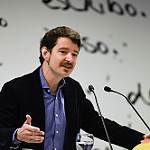Good bye (and thank you!) Uruguay

>>Versión en Español: ¡Chau (y gracias) Uruguay!<<
Five years can be a long time. But it also can be very short, depending on the glass through which you look at it. For instance, five years ago we didn’t have an explosion of face recognition developments as we have today. Five years ago, we had and we still have (and probably it will remain in the coming years) a large number of challenges regarding education and technology (EdTech).
My interest is not to summarize what we build in the last five years (right after working for the OII). It wouldn’t be fair to say that we only created and developed a national and regional research center on digital technologies to support public policies on EdTech. I think we did more than that. Here are highlighted some of the key steps we took to make it happen as well as to suggest some of the explorations that might need to be done in the coming future.
As most people in this field know the excitement that digital technologies generate in education are not necessarily supported by robust or systematic evidences.
While many public policies promise to deliver digital gadgets in the classrooms, only a handful of them provide sound research and impact evaluation needed to understand what works and under what circumstances.
The days in which technologies were meant to be a “mantra” are gone. Now it is known and well documented the importance of defining a common framework, infrastructure, a clear vision and sound management, permanent support to educators and systematic assessments are needed to ensure that digital tools can effectively enrich learning.
Five years ago Uruguay decided to create a research center focused on producing expert knowledge in the field of digital education. After an international call I was humbled to be chosen as director of this novel but ambitious initiative. Being a small country all I knew was the huge opportunity behind connecting and supporting national and international networks of experts in the field of EdTech.
In collaboration with a broad number of partners, we designed a dynamic and flexible institution, open to building connections with key public partners, prioritizing specific research areas more focused on education than on technology. All of these supported by a group of professionals highly committed with the goal of producing actionable knowledge in education. There are no magic recipes. What worked here might not work elsewhere. Here are some of the most relevant priorities we decided to implement.
1. Creating and promoting a culture of evidence and accountability in EdTech. Supporting local and regional academics and researchers as well as public and private research organizations capable of producing knowledge to better understand what works and what doesn’t, and to what extent it can be replicated or improved.
2. Building networks as a golden rule. Connecting a variety of EdTech communities all around the world was a priority. This was grounded on the idea that developing regional capacities would benefit not only a single country but to the whole ecosystem.
3. Understanding the complexity of assessing knowledge in the 21st century. While education is facing permanent needs for transformations, not all that can be counted, counts. We decided to develop a plethora of tools, methodologies and expertise to monitor different kind of learning outcomes both in formal and in informal settings. We wanted to better understand how technology could (or not) serve educators and learners.
4. Developing and consolidating institutional capacities. Different actions were implemented targeting a variety of organizations (public & academic institutions, initiatives from the civil society as well as other multi-lateral networks). In order to ensure long term agendas and high-quality research it was critical to contribute to the institutional development of organizations which work in this field (especially in developing regions where research is still considered a privilege not all can afford).
5. Not only producing knowledge but also translating and disseminating it. It is not enough to produce high-quality knowledge if it is not adapted and adopted by those who can benefit from it. Beyond ensuring all the knowledge generated was openly available online under creative commons licenses, the goal was to design and run a large number of events, talks, books and other publications, multimedia resources, repositories, etc. to ensure that the knowledge produced was accessible for our target communities (policymakers, educators, researchers, mass and digital media, tech developers, parents and families, etc.).
But this is not the end of the story. Actually, this is only the beginning of it. Today there are a number of challenges ahead. The relevance of data-intensive EdTech policies is gaining momentum. Personalization is still a big promise in EdTech. It opens new opportunities but also a large number of complexities to address. Organizations in this field need to address privacy, ethics, data protection, algorithmic transparency and accountability, cyber-well-being among many other dimensions that weren’t well integrated into the EdTech agenda 5 or 10 years ago. A big question on how artificial intelligence can enhance (or not) the role of educators is still a matter to be explored. Better strategies to understand how technology can serve pedagogy(and not in the other way around) will need to be explored.
I am confident that this community will keep exploring these and other challenges ahead. I am deeply thankful for all these years of exchange and learning. Although now I might move to new horizons, I will keep exploring what are the best ways of scaling effective education initiatives, adjusting technologies to support different ways of teaching and learning, especially addressing the more underserved communities.
More information @cristobalcobo.

Posted in aprendizaje colaborativo, Education and ICT, futuro, innovación, Research on Aug 12, 2019




